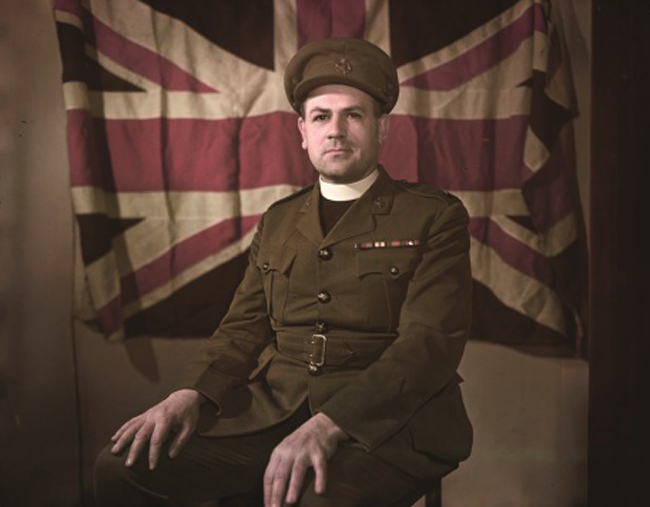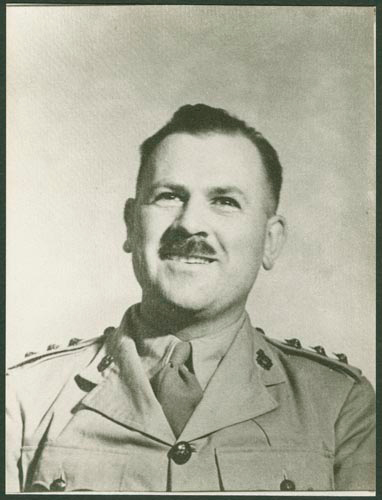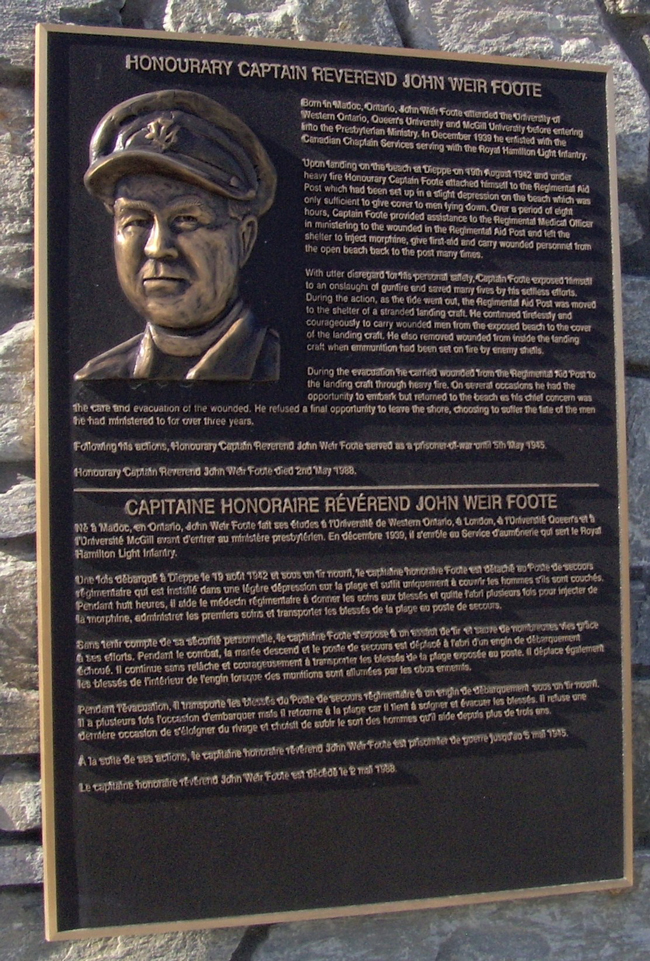
August 19 marks the 75th anniversary of the Dieppe Raid, a pivotal moment in the Second World War. The Allied offensive proved to be an ill-fated attempt to establish a foothold on continental Europe that was completely under control of the German army. Of the 4,963 Canadians who embarked for the operation, only 2,210 returned to England. There were 3,367 casualties, including 1,946 prisoners of war; 916 Canadians lost their lives.
Soon after the Dieppe Raid, stories began circulating among the survivors of a burly chaplain who, with no regard for his own safety, repeatedly ran out onto the exposed beach to carry wounded soldiers back to safety. Padre X, as this anonymous hero was dubbed, singlehandedly saved at least 30 men in this manner, literally pulling them from the jaws of death.
Adding to his legend, Padre X, refused to leave stranded soldiers behind when the order to evacuate was given. “These lads [on the beach] need me more than the ones in England,” he reportedly called over his shoulder as he waded back toward the wounded, German troops closing in.
Padre X was later identified as Reverend John Weir Foote, a former student of McGill grad and Presbyterian College, and Chaplain of the Royal Hamilton Light Infantry. But Foote wasn’t around to hear people sing his praises – he was languishing in a German POW camp.
One of the only real advantages the Allied forces were supposed to have during the Dieppe Raid was the element of surprise. Due to a series of complications and critical errors, most of the German troops were given ample warning to prepare themselves for the assault.
Facing a well-entrenched, seasoned enemy often dug in atop cliffs, most of the Allies’ 6,100-man landing force (comprised of 5,000 Canadians, 1,000 British commandoes and 50 American Rangers) was met with deadly machine gun fire.
Heavily armed German troops rained bullets upon the near-defenceless Canadian soldiers, who struggled to wade ashore in water that was often shoulder deep. Those who made it to the beach scrambled to find cover from the enemy’s withering fire.
One man stood out among a group of beleaguered soldiers, first for his size and then for his heroism. Reverend John Weir Foote, a 6’3” McGill grad, and Chaplain of the Royal Hamilton Light Infantry, continually exposed himself to intense fire to help the wounded and comfort the dying.

Time and again over a period of eight hours, Foote ran from cover to sling stricken soldiers across his powerful shoulders and carry them from the open beach to the Regimental Aid Post. “Moving about the beach, I wonder why I was never hit,” he told the Montreal Star in 1946. “And I have never ceased to wonder why I am alive today.”
When the order was given to evacuate the beach, Foote carried the wounded to landing craft. With German troops closing in, it was clear that some 1,900 men would be left behind. Foote refused to climb aboard, choosing instead, to return to the beach. There were still men to serve. “I don’t think a man should be a padre of a regiment and not go where they go,” he told the Montreal Star.
Captured by the Germans, Foote and the other POWs were driven on a two-day, forced march to a detention camp. Foote was barefoot, having discarded his heavy, water-logged boots on the beach so he could get to the wounded quicker. By the time his group finally reached the POW camp, his feet were worn raw.
Foote spent three years in various POW camps, sometimes enduring horrific conditions, including a 30-day forced march. Through it all, Foote never stopped tending to his flock. Regardless of denomination, every man was treated with the same compassion. Defying the German’s orders, Foote ended each service, which he delivered atop stacked Red Cross boxes, with the singing of the national anthem.
On April 25, 1945, Foote and his fellow POWs were liberated by British forces at Stalag 10B, near Bremen,

A humble man, Foote was worried he might be reprimanded for allowing himself to be captured on the beach at Dieppe. Instead, he became the first Canadian chaplain to be awarded the Victoria Cross, the highest award for military valour that can be won by a Canadian. “I simply did my job as I saw it,” Foote told the Montreal Star in 1946. “It was a very ordinary piece of work.”
Foote stayed in the army until 1948, rising to become Lt. Colonel. He later worked for the Ontario Liquor Control Board, before entering politics and becoming Progressive Conservative member for Durham County, Ontario. Foote died on May 2, 1988, aged 83 years.
“Honorary Captain Foote personally saved many lives by his efforts and his example inspired all around him,” says the Victoria Cross citation. “Those who observed him state that the calmness of this heroic officer as he walked about, collecting the wounded on the fire-swept beach will never be forgotten.”
Read the full Victoria Cross citation.
Read more about John Weir Foote in the McGill Archives.

Would you have seen “Still Voices – Still Heard” The Presbyterian College, Montreal Wipf & Stock, Eugene,m Oregon, 2015 chapter 10 The College and Chaplaincy: John W. Foote by Thomas J. Hamilton? Also, know the names of two ministers who knew Foote personally who might provide insight into his later life. I heard him preach when I was 15.
Readers might wish to learn more about Foote and how he is remembered, at the Wiki page that has been created.
https://en.wikipedia.org/wiki/John_Weir_Foote
The largest physical memorial being the massive dual Armouries complex on James Street North, Hamilton, which was renamed in his honour – John W Foote VC Armoury.